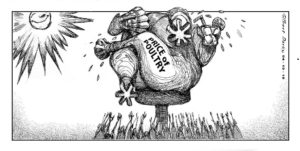OP-ED COLUMN: OPINION & CARTOON – ‘Wanted: SC that’s truly independent’ – Thursday, April 19, 2018
POSTSCRIPT – Federico D. Pascual Jr.

WE invite Supreme Court justices to note the case of James Dimaya, a Filipino immigrant whose deportation from the United States was effectively stopped Monday by a 5-4 vote of the US federal Supreme Court.
We call the SC magistrates’ attention not because the subject is a Filipino but because newcomer Justice Neil M. Gorsuch, who cast the tie-breaking vote, was the first and so far the only appointee of President Donald Trump.
Immigration was a hotly debated issue during the US presidential campaign. Trump is for tighter border control and the removal of illegal aliens who, he says, take away jobs from Americans.
Justices of the Philippine high court, some of whom are under scrutiny for alleged partisanship and lack of independence, may want to reflect on Gorsuch’s handling of legal questions on which Trump’s stance is clear.
The federal court’s 5-4 decision concerns a provision of the Immigration and Naturalization Act (INA) that cites a “crime of violence” as sufficient basis for subjecting a convicted immigrant to speedy deportation.
A federal appeals court in San Francisco had struck down the provision as too vague, basing its ruling on a 2015 Supreme Court decision that nixed a similarly worded part of another federal law imposing longer prison sentences on repeat criminals.
On Monday, the federal Supreme Court agreed with the appeals court, with Trump’s appointee Gorsuch casting the tie-breaking vote. He may have set back the immigration reform moves of the man who appointed him in July 2017.
It would have been easy for Gorsuch to have followed the White House line considering that the Obama administration held substantially the same position on “Sessions v. Dimaya, 15-1498.” But Trump’s trophy appointee did not.
Pardon our mentioning this political footnote, which is irrelevant to a discussion on the merits, but there is this penchant of Filipinos to compare the current president’s actuations with those of his predecessor.
Dimaya immigrated legally to the US as a 13-year-old in 1992. After he pleaded no contest to two charges of burglary in California, deportation proceedings began. The US government said his convictions qualified as “crimes of violence” that allowed his removal.
The case was initially argued in 2017 by the Supreme Court that was split 4-4 on the issue with the death of Justice Antonin Scalia. Gorsuch’s entry was thought to swing the case for the government – but he joined the more liberal justices in finding the INA clause in question too vague to be enforced.
Any alien convicted of an “aggravated felony” after entering the US will almost certainly be deported under the INA.
An aggravated felony includes “a crime of violence for which the term of imprisonment (is) at least one year.” Section 16 of the law divides its definition of a crime of violence into the elements clause [§16(a)] and the residual clause [§16(b)].
The arguments in the court revolved around the residual clause which defines a “crime of violence” as “any other offense that is a felony and that, by its nature, involves a substantial risk that physical force against the person or property of another may be used in the course of committing the offense.”
In the Dimaya case, the respondent had two convictions for first-degree burglary under California law. After his second offense, the government moved to deport him as an aggravated felon.
An immigration judge and the Board of Immigration Appeals held that California first-degree burglary is a “crime of violence” under the residual clause [§16(b)].
While Dimaya’s appeal was pending, the Supreme Court ruled that a similar residual clause in the Armed Career Criminal Act (ACCA) – which defines “violent felony” as any felony that “otherwise involves conduct that presents a serious potential risk of physical injury to another” – was unconstitutionally “void for vagueness” under the Fifth Amendment’s due process clause.
Relying on this ruling (Johnson v. United States, 576 US **), the Ninth Circuit held that the §16(b) clause found in INA was also unconstitutionally vague.
Agreeing that that INA provision is unconstitutionally vague for the reasons given in the Johnson v. United States case, Gorsuch concluded that the “void for vagueness” doctrine, properly conceived, serves as a “faithful expression of ancient due process and separation of powers principles the Framers recognized as vital to ordered liberty under the Constitution.”
• SC independence being tested
GORSUCH was just 49 when his appointment was confirmed, 54-45, in July 2017 by the Republican-dominated Senate that had blocked Obama nominees. He could be sitting there for some 30 more years.
His candor and occasional reference to his wife Louise, seated behind him during the televised confirmation hearings, earned points from those who tended to conservatism and believed in family.
We wonder how a Filipino justice would behave if the President or his runners in/outside the tribunal talked to him/her about something he was interested in a case?
A sample is the quo warranto proceeding against Chief Justice (on leave) Ma. Lourdes Sereno. How has President Duterte’s public declaration of war against Sereno – who he said must be ousted from the SC – affect the justices?
How do we explain the unusual interest that some justices exhibit when a juicy case is tossed to them for adjudication?
Another case that bears watching is the election protest filed against Vice President Leni Robredo by the loser Bongbong Marcos before the Presidential Electoral Tribunal. Are the SC justices sitting as PET judges impervious to pressure?
Thank gad we have televised coverage of SC hearings, especially of sensitive cases. Television exposes a speaker’s poor grasp of the law and/or grammar, or his/her difficulty in expressing convoluted thoughts in English. / The Philippine Star – April 19, 2018 – 12:00am /
.
ASEANEWS EDITORIAL CARTOONS:.
7.1. Yellow spin day – The Daily Tribune

7.2 People look forward to Barangay, SK elections – The Manila Bulletin
.
7.3. Undesirable– The Manila Standard


7.5. Spike in measles – The Philippine Daily Inquirer

.

7. Dapat lang na DA ang humawak sa NFA – Pilipino Star Ngayon

8.1. Premium – Passenger-facing cameras: Encrypt recordings and restrict access – For The Straits Times


Irene Tham – Senior Tech Correspondent – For The Straits Times
VEERA PRATEEPCHAIKUL FORMER EDITOR
– The Bangkok Post


.For comments, Email to :
D’Equalizer | [email protected] | Contributor.

.









